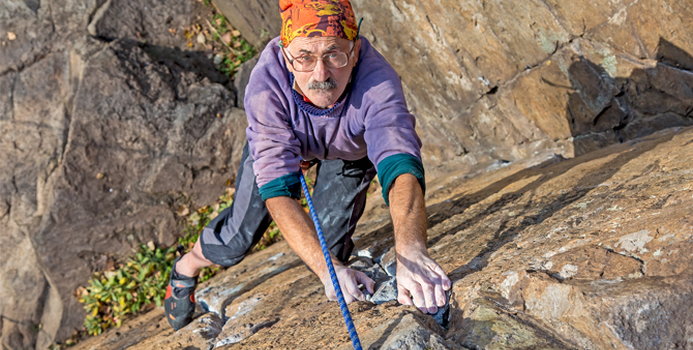If you're a rock climbing enthusiast, you can reap some significant health benefits by regularly participating in this type of exercise. Rock climbing can provide you with both emotional and physical health perks. However, if you do participate in rock climbing, make sure you have proper training and follow safety precautions.
Calorie Expenditure Perks
Rock climbing is an excellent calorie-burning exercise, which can help you achieve or maintain a healthy body weight. Harvard Health Publications reports that a 155-pound person burns about 818 calories hourly during a rock-climbing ascent and 596 calories per hour while rappelling. If you're overweight or obese, burning just 500 calories more than you eat daily can help you shed 1 pound per week.
Chronic Disease Prevention
Rock climbing on a regular basis is an excellent way to reduce your risk for chronic diseases, such as heart disease, high blood pressure, high blood cholesterol and diabetes. The Centers for Disease Control and Prevention defines rock climbing as vigorous-intensity physical activity. Therefore, you only need to participate in 1.25 to 2.5 hours of this intense exercise weekly to reap health benefits, according to the 2008 Physical Activity Guidelines for Americans.
Strength and Toning Benefits
Because you're working a number of different muscle groups when you rock climb, you'll increase your strength and muscle definition by rock climbing regularly. A review published in 2011 in the Journal of Human Kinetics reports that elite rock climbers often have low body mass indexes, low body fat percentages, and increased handgrip strengths.
Psychological Advantages
Rock climbing on a regular basis may help improve your mood or decrease bouts of depression. A review published in 2008 in Annals of General Psychiatry found that a variety of different exercises, including rock climbing, help improve the moods of people suffering from depression. Authors of this review report that in addition to rock climbing, other exercises that have been effective for improving depressed moods include aerobic dancing, jogging, swimming, walking, yoga and tai chi.
Potential Concerns
Rock climbing is an adventure sport that comes with a high risk of stress-related injuries and falls, especially if you're an inexperienced climber. A study published in 2008 in the American Journal of Preventative Medicine found that the many rock climbing injuries seen in emergency rooms were due to sprains, fractures and strains, often in lower extremities, and that the majority of these injuries occurred during falls related to rock climbing. Therefore, despite the numerous potential health benefits that can occur from regular rock climbing, it's important to be aware of injury risks and always follow safety precautions.

Techniques for Proper Breathing While Running
An experienced health, nutrition and fitness writer, Erin Coleman is a registered and licensed dietitian and holds a dietetics degree from the University of Wisconsin-Madison. She also has worked as a clinical dietitian and health educator in outpatient settings. Erin's work is published on popular health websites, such as TheNest.com and J



